BEIRUT: Lebanon issued Monday an arrest warrant in absentia for Syrian general Ali Mamlouk for his alleged involvement in a plot to carry out terrorist attacks in Lebanon. Investigative Judge Riad Abu Ghayda referred the file to Military Prosecutor Saqr Saqr after completion of the investigation, judicial sources told The Daily Star. They said […]
During the 18th and 19th century, under the guidance of the head of the family Cheikh Abou Naufal el Khazen and later on his sons the next consuls combined administrative responsibilities with the function of French consul. The Khazen were successful in spreading the message of the Maronites in Lebanon. They played a unique role […]
During the 18th and 19th century, under the guidance of the head of the family Cheikh Abou Naufal el Khazen and later on his sons the next consuls combined administrative responsibilities with the function of French consul. The Khazen were successful in spreading the message of the Maronites in Lebanon. They played a unique role […]
Maronite Patriarch Beshara al-Rahi condemned on Sunday the recent clash in the Bekaa town of Arsal that left two army officers dead. He said during his Sunday sermon: “We hold political powers responsible for their deaths due to their covering up of such assaults against the army and security forces.” Furthermore, he added: “They […]
President Michel Suleiman on Sunday said that “no one should harbor armed men,” stressing that the killers of Major Pierre Bashaalani and First Sergeant Ibrahim Zahraman “will be punished.” “The state and the army must come first and we hope that justice will be served and the criminals will be arrested,” Suleiman said from the […]
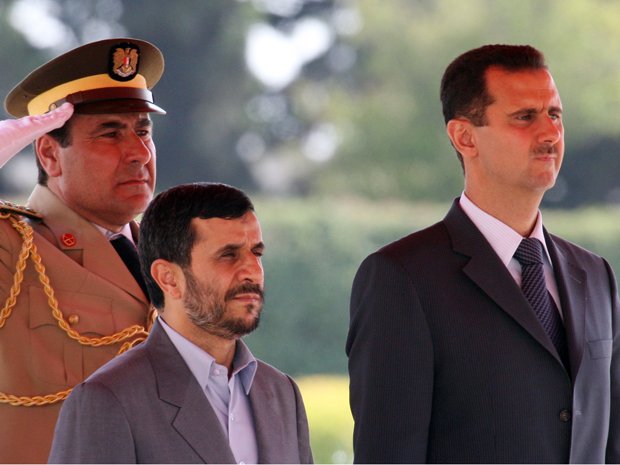
Much like the air campaign against Hamas targets inside the Gaza strip, Israel’s airstrike in Syria looks like a well-timed tactical move—and the confusing media reports regarding the attack may be part of the plan.The Jerusalem Post reports that a Western diplomatic source told Iraqi daily Azzaman that the attack took place more than 48 hours before it was leaked by Israel Furthermore, the source said the reports about a strike on a convoy carrying weapons into Lebanon were probably meant to divert attention away from the operation’s main objective: To use F-16 aircraft to fire at least eight guided missiles at a military research center near Damascus.
On Wednesday U.S. officials — who said they were given forewarning of the strike — told The Wall Street Journal and other outlets that the Israelis were targeting a convoy of trucks allegedly carrying Russian-made SA-17 missiles to Hezbollah. Syria insisted that the reports about the convoy attack were "baseless," and that the real target was a military research center in Jamraya, which lies about three miles from Damascus and eight miles from the Lebanese border.
Maj. Gen. Adnan Salo, a former head of the chemical weapons unit in the Syrian Army who defected and is now in Turkey, told The New York Times that the complex produces both conventional and chemical weapons. The Azzaman source said that the complex is heavily fortified and houses experts from Russia and has been guarded for years by at least three thousand Iranian Revolutionary Guards, adding that the Guards suffered heavy casualties in the strike. The Syrian rebel commander in the Damascus area told Reuters that rebels attacked the facility with "six 120 millimeter mortars" at about the same time that Israeli planes bombed the convoy. But there has been no confirmation of the convoy attack besides unnamed diplomatic and rebel sources saying it occurred three miles south of where the main Damascus-Beirut highway crosses the border into Lebanon.
The Hariri Political Dynasty after the Arab Spring
WARD VLOEBERGHS
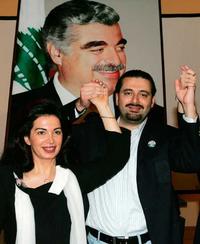
Quite symbolically, in September 2011, the Rafiq Hariri DVD box on offer in downtown Beirut’s Virgin Megastore came at a discounted price. Next door, the flowers at Hariri’s gravesite were no longer being refreshed every couple of days; instead artificial flower arrangements had been planted. Worse, perhaps, in January 2012 Saad Hariri (Rafiq’s son and political successor) broke a leg during asking holiday in the French Alps. Obviously, a year after Saad Hariri’s government had been ousted from power, the juvenile ‘Hariri dynasty’ seemed to have hit an adolescent crisis. Plagued by political rivals, financial troubles and dangerously lingering Syrian crisis, Saad Hariri was spending most of his time between Paris and Riyadh. During the past two decades (1992-2012), the Hariri family has continuously wielded governmental power in Lebanon, except for a short spell between December 1998 and October 2000 and an even shorter period between October 2004 and June 2005. Their conspicuous absence from power in the cabinet since early 2011, which could last until the parliamentary elections of 2013, constitutes a remarkable rupture with the past .In order to understand this dramatic change, this article intends, first, to analyze the birth of a dynasty and, second, the reasons behind its apparent decline before, thirdly, assessing perspectives for its survival in an uncertain regional environment now dominated by the Syrian imbroglio.
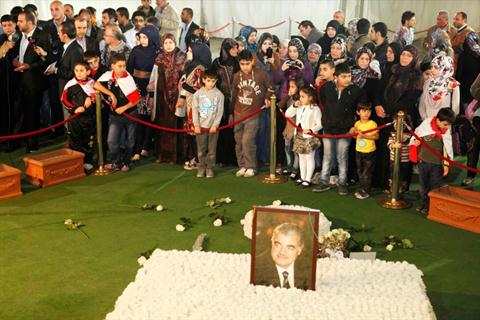
Birth of a Dynasty
After the spectacular assassination of its resourceful patriarch on 14 February 2005, the Hariri family was under pressure to put forward a new leader. The relatives of former Prime Minister Rafiq Hariri(b. 1944) settled the issue in about two months. On 20 April 2005, the family took advantage of the traditional forty days of mourning (arba‘in) to announce that Nazek Hariri (Rafiq Hariri’s widowed second spouse and mother of four of his seven children) was to oversee “all charitable and social institutions” while his son Saad was to “assume the historic responsibility and leadership of all national and political affairs”.
i
Among the direct family members, Bahia Hariri (Rafiq Hariri’s younger sister, b. 1952 and married to her paternal cousin Mustafa Hariri) enjoyed most political seniority. As a parliamentary representative for the family’s hometown of Saida since 1992 and as the erstwhile Director of the Hariri Foundation, she had witnessed from the inside how her brother’s political career unfolded. Moreover, on 28February 2005, Bahia Hariri had delivered an emotional speech in Parliament which had contributed to Omar Karami’s resignation as Prime Minister that same day. Following this intervention, her popularity had risen and several observers may have seen in her a potential first female Arab Prime Minister – although she herself soon contradicted such rumors. Though Bahia Hariri’s absence from the political scene following Saad’s designation was heavily debated, she has continued to be a major force in the family stronghold of Saida. She served as Minister of Education between July 2008 and November 2009.For his part, as Hariri’s eldest son, Bahaa ad-Din (b. 1967) was the natural heir to his father’s political authority. Contrary to his younger brother Saad ad-Din (b. 1970), Bahaa appeared as a strong and flamboyant personality. In the days following his father’s death, it was Bahaa – not Saad – who was presented as the main broker of the family’s interests. It was Bahaa who travelled to Riyadh in early lieutenants in public administration.
Read More [Here]
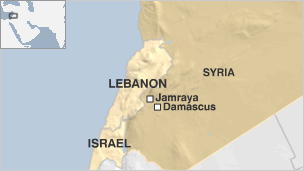
bbc news
Why would Israel attack Syria?
As the uprising against Syrian President Bashar al-Assad nears its third year, concern has been expressed about the possibility of widespread chaos resulting in the loss of control – or deliberate dissemination – of weapons of mass destruction, such as chemical arms Damascus is said to possess. Israeli Prime Minister Benjamin Netanyahu is reported to have threatened to take action in the event of a loss of control by Mr Assad. Israeli military intelligence is thought to be monitoring the area via satellite for any movement of weapons outside Syria’s borders. Israel fears that Syria may unravel in such a way as to seek to destabilise the entire region.
Of particular concern in Israel is Damascus’s support for Lebanon’s Hezbollah. Israeli officials believe that Hezbollah’s arsenal has improved to include thousands of rockets and missiles and the ability to strike almost anywhere inside Israel. A former Israeli intelligence official, Amnon Sofrin, says Hezbollah is known to have been storing some of its more advanced weapons in Syria and will seek to move everything it can into Lebanon. "As soon as these weapons reach Lebanon, they are swallowed up in secret underground stockpiles. Looking for them will be like searching for a needle in a haystack," Israeli defence analyst Alex Fishman said in the Yedioth Ahronoth newspaper. "If chemical weapons are brought into Lebanon, Israel will probably not hesitate – and will attack," Mr Fishman said. Israeli Home Front Defence Minister Avi Dichter said on Tuesday that options to prevent Syria from using or transferring the weapons included deterrence and "attempts to hit the stockpiles".
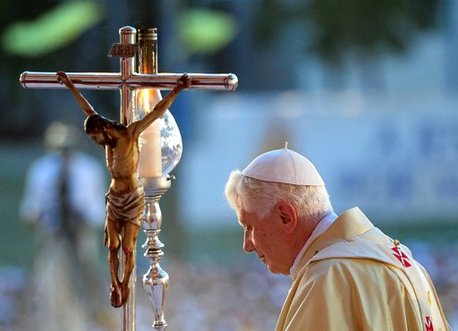
.- Pope Benedict XVI is having his message for this year’s World Day of the Sick published in Arabic for the very first time."The Holy Father probably wants to transmit a message on this day to the Syrian people because it’s the first time that his message will be published in Arabic," said Archbishop Zygmunt Zimowski, president of the Pontifical Council for the Pastoral Care of Health Care Workers. The Pope’s message, drafted in several languages, is centered on the Good Samaritan. It is titled "Go and you, too, do the same," and was released at a Jan. 29 press conference in Rome.
The World Day of the Sick is observed annually on Feb. 11 for the feast of Our Lady of Lourdes, and this year it will be held at the Marian shrine of Altötting in Bavaria, Germany. "The World Day of the Sick was created by Blessed John Paul II 20 years ago," explained Archbishop Zimowski.
"Pope John Paul II, a suffering man among the suffering, wanted for suffering to be seen close to Jesus Christ, who suffered for us for our salvation," the archbishop reflected. "He wanted that God’s people become more sensitive to the sick and the suffering and that those suffering find a deeper meaning to their suffering," he added.
Archbishop Zimowski noted that John Paul II wrote about the Good Samaritan and he taught that “doing good to those who suffer is doing good from one’s own suffering.”



